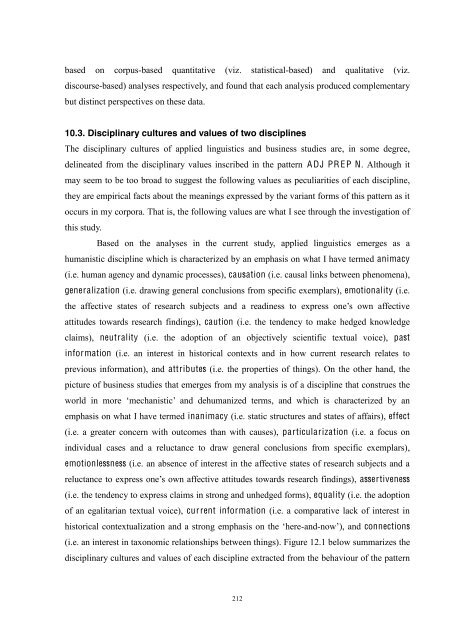Evaluative Meanings and Disciplinary Values - eTheses Repository ...
Evaluative Meanings and Disciplinary Values - eTheses Repository ...
Evaluative Meanings and Disciplinary Values - eTheses Repository ...
Create successful ePaper yourself
Turn your PDF publications into a flip-book with our unique Google optimized e-Paper software.
ased on corpus-based quantitative (viz. statistical-based) <strong>and</strong> qualitative (viz.<br />
discourse-based) analyses respectively, <strong>and</strong> found that each analysis produced complementary<br />
but distinct perspectives on these data.<br />
10.3. <strong>Disciplinary</strong> cultures <strong>and</strong> values of two disciplines<br />
The disciplinary cultures of applied linguistics <strong>and</strong> business studies are, in some degree,<br />
delineated from the disciplinary values inscribed in the pattern A DJ PR EP N. Although it<br />
may seem to be too broad to suggest the following values as peculiarities of each discipline,<br />
they are empirical facts about the meanings expressed by the variant forms of this pattern as it<br />
occurs in my corpora. That is, the following values are what I see through the investigation of<br />
this study.<br />
Based on the analyses in the current study, applied linguistics emerges as a<br />
humanistic discipline which is characterized by an emphasis on what I have termed animacy<br />
(i.e. human agency <strong>and</strong> dynamic processes), causation (i.e. causal links between phenomena),<br />
generalization (i.e. drawing general conclusions from specific exemplars), emotionality (i.e.<br />
<br />
attitudes towards research findings), caution (i.e. the tendency to make hedged knowledge<br />
claims), neutrality (i.e. the adoption of an objectively scientific textual voice), past<br />
information (i.e. an interest in historical contexts <strong>and</strong> in how current research relates to<br />
previous information), <strong>and</strong> attributes (i.e. the properties of things). On the other h<strong>and</strong>, the<br />
picture of business studies that emerges from my analysis is of a discipline that construes the<br />
world in more mechanistic <strong>and</strong> dehumanized terms, <strong>and</strong> which is characterized by an<br />
emphasis on what I have termed inanimacy (i.e. static structures <strong>and</strong> states of affairs), effect<br />
(i.e. a greater concern with outcomes than with causes), particularization (i.e. a focus on<br />
individual cases <strong>and</strong> a reluctance to draw general conclusions from specific exemplars),<br />
emotionlessness (i.e. an absence of interest in the affective states of research subjects <strong>and</strong> a<br />
, assertiveness<br />
(i.e. the tendency to express claims in strong <strong>and</strong> unhedged forms), equality (i.e. the adoption<br />
of an egalitarian textual voice), current information (i.e. a comparative lack of interest in<br />
historical context-<strong>and</strong>-), <strong>and</strong> connections<br />
(i.e. an interest in taxonomic relationships between things). Figure 12.1 below summarizes the<br />
disciplinary cultures <strong>and</strong> values of each discipline extracted from the behaviour of the pattern<br />
212
















